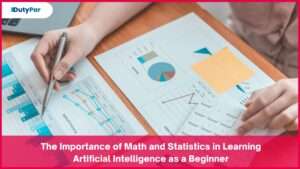 Artificial Intelligence (AI) is a field that is rapidly growing and transforming the world we live in. As a beginner in AI, it is important to understand the role that math and statistics play in this field. In this article, we will explore why math and statistics are essential for learning AI and how you can prepare yourself to become a successful AI practitioner.
Artificial Intelligence (AI) is a field that is rapidly growing and transforming the world we live in. As a beginner in AI, it is important to understand the role that math and statistics play in this field. In this article, we will explore why math and statistics are essential for learning AI and how you can prepare yourself to become a successful AI practitioner.
Why Math and Statistics are Essential for AI?
Machine Learning, which is a subfield of AI, relies heavily on mathematical concepts and techniques.
This is because AI models need to be trained using large amounts of data, and math and statistics provide the tools to analyze and make sense of this data. Some of the most important mathematical concepts that are used in AI include Linear Algebra, Calculus, and Probability.
Linear Algebra is used to represent and manipulate data in AI models.
This includes tasks such as transforming data into different coordinate systems, finding patterns in data, and understanding the relationships between different variables.
Linear Algebra is also used to solve systems of equations, which is important for optimizing AI models.
Calculus is used in AI for tasks such as optimization and differentiation.
Optimization is the process of finding the best parameters for an AI model to achieve its desired outcome, such as accurate predictions or classifications.
Differentiation is used to calculate the gradients of functions, which is important for optimizing AI models.
Probability and Statistics are used to understand the uncertainty that exists in data.
This includes tasks such as estimating the probability of an event occurring, analyzing the distribution of data, and making predictions based on statistical models.
Probability and Statistics are also used to evaluate the performance of AI models and determine their accuracy.
Neural Networks, which are the backbone of many AI models, are modeled after the structure of the human brain.
These networks are made up of interconnected nodes that process information and make decisions based on the input data.
Neural Networks use mathematical concepts such as Linear Algebra and Calculus to perform complex operations on large amounts of data.
How to Prepare Yourself for Learning AI?
If you are interested in learning AI, it is important to have a strong foundation in math and statistics. This will help you understand the concepts and techniques that are used in AI and give you the ability to design and implement your own AI models.
Here are some steps you can take to prepare yourself for learning AI:
1. Start by learning the basics of Linear Algebra, Calculus, Probability, and Statistics. There are many online resources.
2. Once you have a good understanding of the basics, start learning about Machine Learning and Neural Networks. There are many online courses available that can help you get started.
3. Practice by implementing your own AI models. There are many libraries and frameworks available that can help you build your own models, such as TensorFlow, PyTorch, and Scikit-Learn.
4. Stay up-to-date with the latest developments in the field of AI. Subscribe to newsletters, follow experts on social media, and attend conferences and meetups to learn about the latest techniques and trends.
Conclusion
Math and statistics are essential for learning AI, as they provide the tools to analyze and make sense of large amounts of data.
Linear Algebra, Calculus, Probability, and Statistics are just a few of the mathematical concepts that are used in AI, and they are essential for tasks such as optimization, differentiation, and evaluating the performance of AI models.
If you are interested in learning AI, it is important to have a strong foundation in math and statistics, and to stay up-to-date with the latest developments in the field. By following these steps and continuously learning and practicing, you can become a successful AI practitioner.
